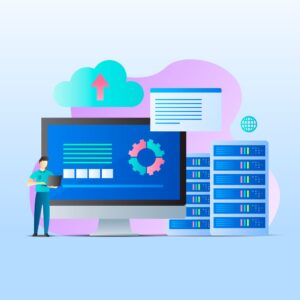If you are looking into a new Enterprise Resource Planning (ERP) software, chances are your current business processes arent cutting it anymore regardless of whether you are using spreadsheets or some other application. ERP software helps you integrate and manage your day-to-day business processes under a single suite platform. This streamlines the flow of data between departments to provide you with a single source of truth when analyzing data.
While there are many cloud technology solutions for ERP, they all have similar baseline functionality. ERP software connects your systems across business departments supply chain, accounting, procurement, human resources, etc. into a central database. This enables you to integrate your business and your data in ways that were previously unattainable.
In the early days of on-premise systems, ERP was only a dream for small to medium-sized businesses (SMBs). Most SMBs didnt have the resources or capital to invest in the servers needed to run their hardware. Pair this lack of resources and/or capital with the rapid technology improvements causing systems to depreciate along with the additional expenses of customizations, and it was often too much for a business to justify their investment.
However, continuous advances in technology offer SMBs the opportunity to implement cutting-edge solutions that were previously unattainable. This is especially true when it comes to ERP software systems as they are more affordable and accessible than ever before.
Cloud-based ERP systems are now the industry standard, helping SMBs across the globe fuel their business growth. But what makes cloud-based systems different from legacy on-premise systems? How do I know what is right for my business? What are the best cloud-based ERP systems on the market? In this blog post, we will use our years of ERP expertise to answer these questions and give you peace of mind when it comes time to shop for an ERP system.
What Is Cloud-Based ERP?
Cloud-based ERP software functions the same as older on-premise systems but relies on servers in the cloud rather than on-site servers. This gives businesses the ability to expand operations without large capital investment. This also moves data to a central location, helping streamline business processes, optimizing resources, and improving productivity and efficiency.
In addition to the advancements in cloud technology, ERP software is also available to purchase in a Software as a Service (SaaS) model. This model allows companies/users to access their software on a subscription basis while hosting on a central server. This is great for businesses that previously lacked the capital to invest in servers, hardware licenses, and training. Now, SMBs can choose the pricing plan that fits their current needs and allows for scalability.
Cloud-based ERP systems also allow companies to deploy their systems globally, providing end-users with real-time data, regardless of their geographic location. The ability to access data across an organizations value chain enables better collaboration and decision-making.
5 Popular Cloud ERP Solutions
Now that we have covered the basics of cloud-based ERP software, let’s take a look at some of the different cloud ERP solutions on the market. Although it is not an exhaustive list, we have picked five of the most popular software options currently available to highlight for you.
Cloud ERP solutions are listed in alphabetical order.
Microsoft Dynamics GP
Microsoft Dynamics GP is an accounting software geared towards SMBs that excels in its functionality and customizable reporting. If you have a background in finance, you can trust that your daily accounting practices will be stronger than ever. This software has been around for quite some time allowing for a vast selection of add-on options, including direct connections to Microsoft Office applications. This integration is great for many businesses that utilize the Microsoft family of products for their day-to-day business operations. That is one of the main reasons businesses choose Microsoft Dynamics GP. With competitive market pricing, Microsoft Dynamics GP puts itself in contention with the different ERP software options available.
However, there are few key areas that Microsoft Dynamics GP lacks, with the most severe being the user interface. The front end often feels clunky, outdated, and confusing to use for most people making it difficult to take advantage of the features that Microsoft Dynamics GP packs in its software. Due to its larger learning curve, training your employees to feel comfortable with the software can prove to be a substantial task. Additionally, if your business needs to upgrade or customize this solution to fit specific business needs, it can prove to be quite an investment as you will be configuring with Microsoft partners/resellers. Other solutions on the market provide a more direct, easy approach to upgrades than Microsoft Dynamics GP.
Lastly, Microsoft Dynamics GP is not offered as a true-cloud solution, making it one of the only software options on the market that does not have a SaaS subscription model available. The software is still supported by Microsoft but still hasnt caught up to the current times.
Microsoft Dynamics GP contains many features that can help multiple areas of your business. With customizable reports, good base features, and reliable functionality, there is no wonder why it became an industry leader in the 1990s and early 2000s. However, it has struggled to keep up with the times when it comes to user interfaces, workflows, and customization options that make it difficult to justify among the different true-cloud ERP software options available now. Simply put, Microsoft Dynamics GP trades user experience for functionality.
NetSuite
NetSuite fuels business growth from the ground up, regardless of your business size. With solutions widely available for SMBs and excellent scalability, you can pick the system that works best for you now and know that this software will grow with you. This means you wont have to replace it down the road. NetSuite is one of the most extensible ERP software products on the market giving businesses the flexibility to customize their system to fit specific needs.
Pending your budget, timeline, and resources, nearly anything is possible in NetSuite. Due to its range of integration and customization options, NetSuite is one of the best options to unite all of your business processes under a single system. Only using one system for your entire company eliminates uncertainty around your data, providing you with a single source of truth to make key business decisions with the most accurate information possible. Additionally, NetSuite has a vast array of modules available to meet the industry-specific demands of customers.
NetSuites concerns mainly revolve around maintenance. If you opt for an extensively customized system, you might need to work with a NetSuite partner/consultant to ensure your system runs smoothly. Without the help and support of a trusted partner, these customizations might be too complex to tackle on your own. Additionally, if you want the most advanced functionality from your NetSuite system, you will need to purchase additional modules.
NetSuite is a multi-tenant SaaS cloud-based business solution that is fully agile, flexible, and customizable, making it one of the more robust systems on the market. When working with a partner who can provide dedicated support and the expertise needed to unlock the full potential of the software, its hard to find a better ERP system available. It is among the best in its class.
QuickBooks
QuickBooks is often a smaller companys first accounting software purchase and rightfully so. Coming in at an extremely affordable rate, it’s a great introductory system for small businesses. Ideal for companies that havent expanded to a level where they can afford or fully utilize a more robust ERP system, QuickBooks can help take some of the accounting workloads off your shoulders to focus on business operations and company growth.
QuickBooks is quick to implement in comparison to more in-depth ERP software and includes great support for a companys financials with bookkeeping support through QuickBooks Live a feature that is great for those who may struggle with their own bookkeeping. Finally, QuickBooks provides a great UX that is easy to learn and accessible from any device.
Despite being a great option for small businesses, some concerning limitations start to present themselves as your company begins to grow. The QuickBooks software struggles with reports outside of accounting making it difficult to analyze all of your business processes and make critical business decisions. Along with the lack of reporting features, it also struggles with other industry-specific features that most ERP systems include, such as eCommerce. And if you start hiring new employees, there are limitations on the number of users in your QuickBooks system.
Built with functionality geared towards new businesses, QuickBooks can be helpful to get your business up and running with entry-level software at an attractive price. However, there are many benefits related to switching from QuickBooks to an ERP, and as your business grows you will most likely need a more reliable, feature-heavy ERP system to keep up with your day-to-day operations. Otherwise, you might risk falling behind the competition.
Sage Intacct
Sage Intacct is one of the strongest financial management and business accounting software on the market. The company has made a name for itself with the strength of its product. Using the softwares deep accounting functionality and multiple integration options, businesses can create a system that fits their specific financial requirements. A worthwhile step up from QuickBooks, Sage Intacct is great for companies that are fast-growing and need more features than what was available in their previous system. Simply, the end goal of implementing this software is to automate your finances to help your business streamline complex processes.
Although Sage Intaccts financial functionality is strong, it struggles as an all-in-one ERP software solution. Their batch-processing architectures and lack of flexibility slow down reporting, making it difficult to retrieve real-time data and hindering your ability to make important business decisions. Additionally, some of the reporting features can be difficult to use for some end-users causing them to revert back to Excel rather than working within the system.
If you conduct any international business, Sage Intacct has barriers that can affect your day-to-day operations. Currently, they only offer support in the English language and struggle with different currency conversions. Lastly, limited customizations beyond the core product make it difficult to connect all of your business operations into one software.
Sage Intacct is a popular option for financial management and it comes as no surprise. With functionalities built to help you automate all of your business accounting processes, it helps your business focus its attention on other departments. However, Sage Intaccts functionality beyond financials lacks severely when compared to other software options. If you are looking for cohesive business software to unite multiple departments, this is likely not the solution for you.
SAP Business ByDesignhttps://www.entartes.com/blog/when-it-is-tizme-to-switch-your-erp-vendor
SAP Business ByDesign is a true, cloud-based SaaS model ERP system built for SMBs to get up & running both quickly and efficiently. One of the main advantages that SAP Business ByDesign offers is its competitive price point. It often comes in at an affordable rate that allows businesses to jump-start their business processes without breaking the bank. Add in an easy-to-use platform with Microsoft Office integration and advanced analytics to deliver real-time information, and it is no shocker why SAP is one of the long-time leaders in the ERP space.
However, SAPs simplicity comes at a cost. With a limited selection of third-party applications and customization options that are often expensive and difficult to implement, SAP Business ByDesign can be limiting for businesses needing a more complex system to handle tedious processes. When you invest in this software, you are pretty much running it out of the box unless you have the proper time, money, and expertise to craft a custom system.
SAP Business ByDesign is great if you want to start small and expand when necessary with decent scalability options. Top that off with good customer support and a simple UI, and SAP is a great beginner option for small businesses. However, SAP Business ByDesign can struggle to compete when it comes to customizing an ERP system beyond the features they include with your licenses. If your business needs a more robust system, this might not be the best fit.
Find the Best ERP Solution for Your Business
As you can tell from each of the product summaries, no ERP software is perfect. Each has its own strong suit that makes its product best for certain businesses. We hope this blog post has provided you with enough useful information to help you begin your ERP search. The team at Entartes has decades of ERP experience and we work to stay educated on the marketplace.
As NetSuite consultants, we truly believe that when implemented correctly there is no better option to unite all of your business processes under a single ERP system. That is why we have chosen to help businesses grow with this software for the past two decades.
If you are still wondering if NetSuite is the best fit for your business, or you just want to learn more about it, feel free to book a meeting on my calendar to talk with a NetSuite expert.



